With AFI and USC dominating this year’s seven finalist slots, this year’s batch of Student Academy Award nominees continue to highlight a diverse, colorful blending of genres from filmmakers of all walks of life. Whether feminist dystopian sci-fi or electrically choreographed musicals, there’s something here for everyone, and it shows in the backgrounds of each of these talented directors. In this interview series, Film Section Editor Sergio Zaciu sat down with all seven finalists of 2019’s Narrative – Domestic section, hoping to learn more about their personal backstories, what brought them to the director’s chair, how they made their respective films, and what exciting prospects await them next in their careers.
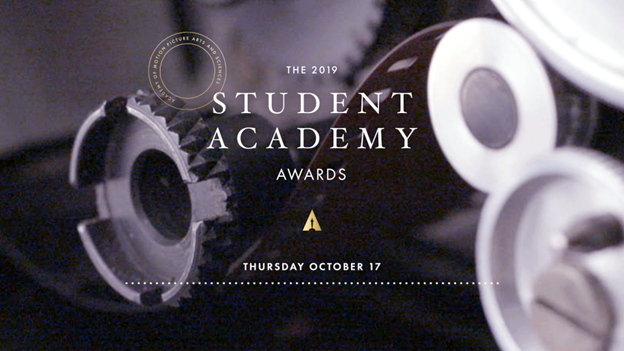
AFI hit the Student Academy Awards like a wrecking ball this year, racking up five out of the seven finalist slots in the Narrative – Domestic section. Among them is Orani Zegman’s MARRIAGE MATERIAL, easily the most ambitious production of the batch. Feverishly jumping from one dance routine to the next, Zegman’s film is AFI’s first musical thesis film in its 51-year history: and what a debut it is! Pulling no stops, Zegman’s film boasts unbelievably memorable showtunes and an incomparably refreshing visual aesthetic. A heartrending central performance and a showstopping climax round off a film that elegantly juggles a ludicrous amount of moving pieces. If you thought it would be impossible to make a great musical short film, think again!
I’m really curious about how you got to this story. What parts of this are drawing from personal experience and which are pure fiction?
Well, I never thought I was going to do a musical at AFI. In fact, MARRIAGE MATERIAL is the first musical ever made at AFI in its 51-year history. It’s a hard thing to do, and it was hard to pull off. But yeah, it was influenced by basically my life story. I grew up in Israel and moved to LA in my 30s. I was still single, and if you’re a woman over 30 that’s still single, people start to think that there’s something really wrong with you. Culturally, most people get married by 30, and women who don’t feel like they’re damaged goods. It’s like you’re failing your parents’ expectations. Fitting into the idea of marriage really bothered me because I was always so focused on my career. I was an actor for many years in Israel and slowly transitioned into becoming a director, and as I would date during that time, people would look at me like “what’s wrong with you? How come you’re 31 and still available?” More often than not, I felt like maybe I was not good enough. I tried to change myself for them. I wanted to be good marriage material. So this movie is very much about the fear of loneliness, which is something that really bothered me in Israel. I was able to leave that behind when I moved to LA, mostly because nobody cares about you here *Laughs* But I love that people mind their own business here. There is no such thing as personal space in Israel. We call it a “Jewish cliche,” but it really is true.
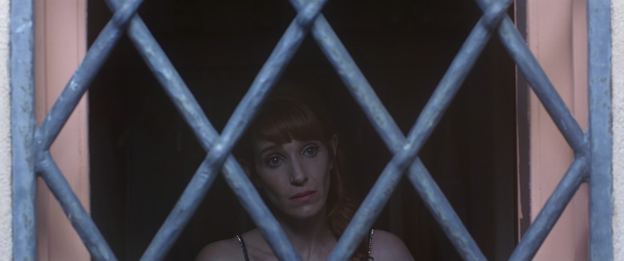
So how did this personal experience translate into the writing of the short film?
Well first off, I thought to myself, what if there’s a school that actually teaches you how to be marriage material? As we wrote it, my composer’s wife mentioned that this film needs a BLACK MIRROR-esque ending, and at that point I finally realized exactly how I need to conclude my short film.
Did you always intend for it to be a musical?
Yes, I always wanted to make a musical. It actually started with the idea of the Yenta character (a Yiddish term for a matchmaker or gossip-type), and blossomed from there. I was always into musicals as an actor and did a lot of musical theatre along the way. There’s not a lot of money for films in Israel, so when I moved here I wanted to do something big. I wanted the film to make a big statement in the end, but also be entertaining, so I let the music and the tone really carry the film.
Did you write the lyrics yourself or with your composer?
With my composer. It was like a dance. We did it all together.
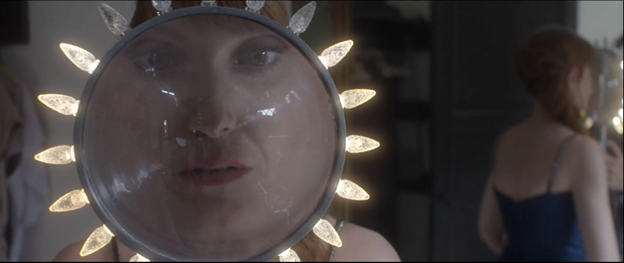
Where did you find him?
I met him in LA, but he’s Israeli too, and is quite successful in Israel. In fact, I used to go and audition for his projects hoping to get a part. I became friends with his wife in LA and she then told me that her partner was Ben Zeadman! We finally met and we just fell in love with the story. He became the ultimate creative partner.
What was it like writing the musical instrumentation?
That’s a good question. Every song has its own story. So I explained how each song pertains to the plot and he would do this amazing thing that only musicians can do where they can suddenly write the melody. Sometimes I’d come up with words first and then he’d write the instrumentation, and sometimes we’d tweak it all together. After we wrote the preliminary music for each song, we’d have an orchestrator discuss the emotions of the songs. We’d figure out what emotion would lead what part of each song, and refer to musical numbers that would match the tone I’m looking for. It was really hours-long of commitment to the process. Even talking about it now gives me chills. Being a musician is really like being a magician!
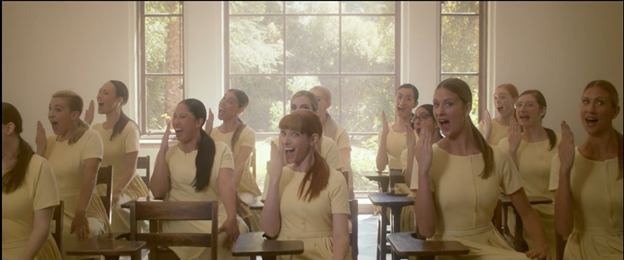
How did you then choreograph it and prepare with your DP to accommodate it?
We actually had three choreographers who were all in charge of different numbers. I was a dancer ever since I was born and so we’d have very intense conversations about the process. The choreographers would then play around with it and we’d workshop and rehearse. We were lucky because we had a lot of time to prepare, my producers were really good with that. And at the end of every rehearsal day, my DP would come by and film the dance so that we could get an idea of what we would need to film this like. Since it was a student film we only had six days to shoot, so there was a lot we needed to get accomplished within this small timeframe. We had three cameras running at the same time and we always filmed the numbers exactly as rehearsed.
Can you talk a little bit more about the collaboration with your DP, specifically how you worked together on set?
We connected really well on this film and made sure to be on the same wavelength, developing the visual language of the film. The joke was that if I would somehow be sick and not show up to set, Charlie [the DP] would still know what to do. The style played as big of a role as anything, so we created a huge 60-page lookbook that explained what the lights, tone, and aesthetic choices would be—everything from the color palette to the textures on the walls.
Did you have a dominant reference from a pre-existing film?
Yes. THE LOBSTER and STEPFORD WIVES. I had a lot of inspirations from musical numbers, but there was not a single musical that was actually used as an overall reference. THE LOBSTER really became a dominant influence because we wanted to use these concepts of “coupling” items by having lots of duplicates in frame (two roses, two people, etc.), and we wanted to contrast this notion of happy-happy-joy-joy with the more sinister imagery. So we played a lot with negative space as well. We didn’t want the camera to move without motivation, so we kept the camera locked off almost entirely. In fact, we initially planned to shoot with a steadicam, but we quickly realized that it felt completely wrong for the visual language we created, so we didn’t end up using it.
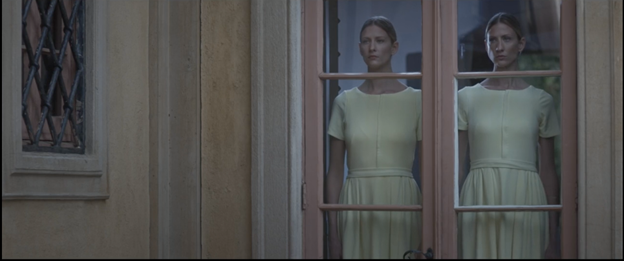
Since this was the first musical done at AFI, what was the process like with the school supporting the project?
The faculty was both excited and scared. They really didn’t want me to fail. At the beginning they tried to tell us to tell this story after graduating. It wasn’t really concerns about the talent of the key team, but more about the other people who would be volunteering on our set and were still a little green. Everyone involved needs to be in the game and as professional as possible. So yeah, they were a little concerned, but they supported us a lot. We quickly realized that we needed to raise even more money than was permitted, so AFI opened up their agreement with SAG-AFTRA and allowed us to extend the budget up to $83,000. They really wanted to make sure we had everything we needed in order to make it happen.
What was the most important takeaway from the filmmaking experience?
I could talk for hours about my cast. They’re like family. But what I really realized was that everybody involved needs to be completely dedicated to telling the story. And the girls who acted in this film really wanted to share this with the world. It was so important to them. In fact, the MeToo movement started two months after I started writing the script. It was really crazy timing and really pushed everyone to share this story.
In addition to the festival run, you’re also preparing this as a TV show, which is amazing! Anything you want to share about that?
It will be a Quibi show, so you can find it there! I’m writing it right now and will be directing the episodes, so that’s really exciting. We also just sold the short to Fox Searchlight!
Amazing! Well, thank you for talking to me!
Thank you!
Catch MARRIAGE MATERIAL at the festival circuit and keep your eyes peeled for more of Orani’s work in the future!





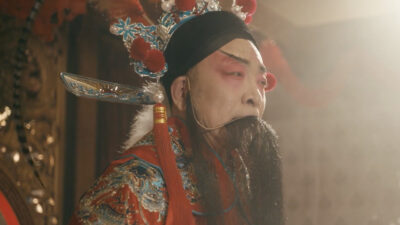
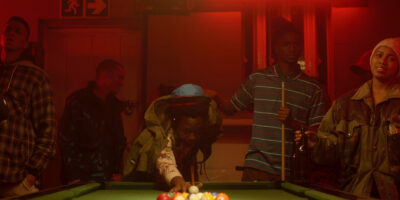

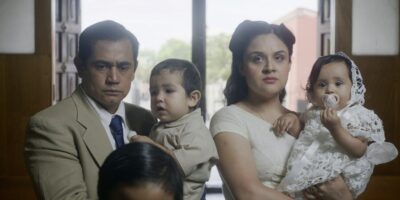
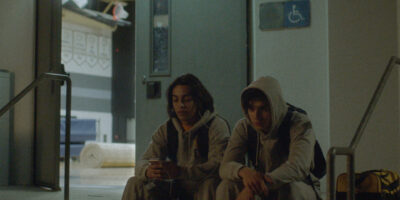
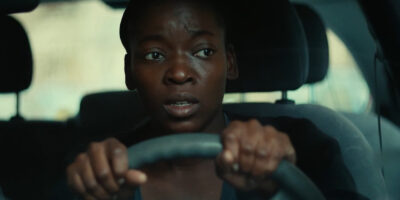





Comments